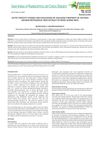 December 2023 in “Malahayati International Journal of Nursing and Health Science”
December 2023 in “Malahayati International Journal of Nursing and Health Science” Chemotherapy in children often causes hair loss, nausea, vomiting, and mood swings.
 December 2023 in “Frontiers in pharmacology”
December 2023 in “Frontiers in pharmacology” Progesterone initially worsens but later reduces neuropathic pain in mice, through different mechanisms.
 November 2023 in “Deleted Journal”
November 2023 in “Deleted Journal” Cedrus libani has potential medicinal uses but needs more safety studies.

Dianabol boosts muscle growth but has serious health risks and legal issues.
 October 2023 in “Biomedical science and engineering”
October 2023 in “Biomedical science and engineering” Innovative methods are reducing animal testing and improving biomedical research.
 October 2023 in “Frontiers in endocrinology”
October 2023 in “Frontiers in endocrinology” Effective PCOS treatments require targeting specific signaling pathways.
 September 2023 in “medRxiv (Cold Spring Harbor Laboratory)”
September 2023 in “medRxiv (Cold Spring Harbor Laboratory)” Long-COVID has diverse, long-term health impacts, especially in young people.
 January 2023 in “Research Square (Research Square)”
January 2023 in “Research Square (Research Square)” Hair cortisol may be a good indicator of recent mood in people with bipolar disorder.

There is no cure for myotonic dystrophy type 1, so treatment focuses on managing symptoms and complications.
 November 2022 in “CARDIOMETRY”
November 2022 in “CARDIOMETRY” A group has developed therapies that show promise for treating cancer and various other conditions.
 December 2021 in “Research Square (Research Square)”
December 2021 in “Research Square (Research Square)” Hair follicle sampling is a feasible method to measure FMRP and FMR1 mRNA levels in children.
 September 2021 in “Research Square (Research Square)”
September 2021 in “Research Square (Research Square)” Not having enough or having too much of the protein Grainyhead-like 3 leads to various developmental problems.

Wild African goats have genetic adaptations for surviving harsh desert conditions.
 June 2020 in “Applied sciences”
June 2020 in “Applied sciences” A new semi-automatic hair implanter could make hair transplants easier, more successful, and more accessible.
 September 2019 in “Asian Journal of Pharmaceutical and Clinical Research”
September 2019 in “Asian Journal of Pharmaceutical and Clinical Research” Teak seed extract is safe and reduces pain in mice.
 January 2019 in “Elsevier eBooks”
January 2019 in “Elsevier eBooks” Different hair disorders have specific treatments and outcomes, with some resolving on their own and others requiring medication or emotional support.
 January 2019 in “ARC journal of pharmaceutical sciences”
January 2019 in “ARC journal of pharmaceutical sciences” Acne can be managed with various treatments and requires psychological support due to its emotional impact.

 July 2017 in “Contemporary Endocrinology”
July 2017 in “Contemporary Endocrinology” The document concludes that patient outcomes for Congenital Adrenal Hyperplasia are often not ideal because of poor management and a need for better diagnosis and treatment methods.
 March 2017 in “Fundamental & Clinical Pharmacology”
March 2017 in “Fundamental & Clinical Pharmacology” The model and estimator can predict drug exposure in kidney transplant patients well.
 January 2017 in “Acta dermato-venereologica”
January 2017 in “Acta dermato-venereologica” The congress showed that psychological therapy can help skin condition patients, social media affects acne stigma, education improves atopic dermatitis, and patient satisfaction in dermatology is high, especially with good doctor engagement.
 January 2017 in “Elsevier eBooks”
January 2017 in “Elsevier eBooks” Stress and hormones like progesterone can affect absence seizures, but their effects change with different life stages.
 December 2016 in “Springer eBooks”
December 2016 in “Springer eBooks” Chrousos Syndrome is caused by mutations that make the body less sensitive to glucocorticoids, leading to various symptoms and requiring high-dose treatment.
 November 2016 in “Elsevier eBooks”
November 2016 in “Elsevier eBooks” Genetic mutations can affect female sexual development, requiring personalized medical care.
 September 2016 in “Princeton University Press eBooks”
September 2016 in “Princeton University Press eBooks” The document concludes that understanding health requires considering evolutionary perspectives on reproductive fitness, and recognizing the complexity of factors like diet, testosterone, and sexual orientation.
 September 2016 in “Elsevier eBooks”
September 2016 in “Elsevier eBooks” Different types of hair loss in dogs and cats have various causes and treatments, with outcomes ranging from good to uncertain.
 October 2015 in “Elsevier eBooks”
October 2015 in “Elsevier eBooks” Aldesleukin can treat certain cancers and increase HIV patient CD4+ counts but often causes severe side effects.
 September 2013 in “Neurodegenerative disease management”
September 2013 in “Neurodegenerative disease management” Teriflunomide is effective and generally safe for treating relapsing multiple sclerosis, reducing relapse rates and disability progression.
 February 2012 in “InTech eBooks”
February 2012 in “InTech eBooks” PCOS increases the risk of heart disease and type 2 diabetes in women.
 January 2012 in “Methods in pharmacology and toxicology”
January 2012 in “Methods in pharmacology and toxicology” TRPV3 could be a target for treating pain, skin disorders, and hair problems, but more research is needed to create effective drugs.






























